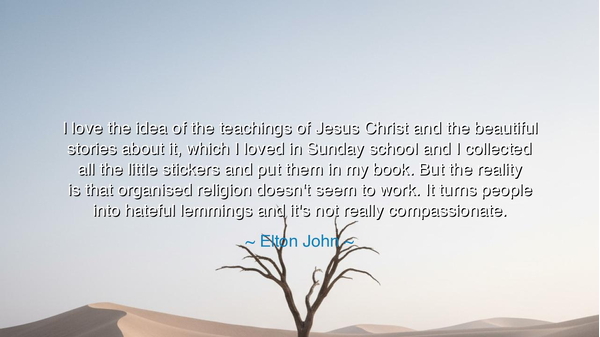
I love the idea of the teachings of Jesus Christ and the
I love the idea of the teachings of Jesus Christ and the beautiful stories about it, which I loved in Sunday school and I collected all the little stickers and put them in my book. But the reality is that organised religion doesn't seem to work. It turns people into hateful lemmings and it's not really compassionate.






Hear, O seekers of truth, the words of Elton John, who spoke with both tenderness and fire: “I love the idea of the teachings of Jesus Christ and the beautiful stories about it, which I loved in Sunday school and I collected all the little stickers and put them in my book. But the reality is that organised religion doesn’t seem to work. It turns people into hateful lemmings and it’s not really compassionate.” In this saying lies the lament of one who once cherished the beauty of faith, but who, upon seeing the conduct of many religious institutions, found a harsh contrast between the message of love and the reality of division.
The origin of these words lies in Elton John’s own life journey. As a child, he was enchanted by the stories of Jesus—tales of kindness, healing, forgiveness, and love for the outcast. These teachings inspired him and left their imprint upon his heart. Yet as he grew older, he witnessed how organized religion, rather than amplifying that message, often distorted it—fostering judgment, intolerance, and even hatred. His words echo the disillusionment of many across history who have seen the flame of faith corrupted by the cold machinery of institutions.
The ancients themselves wrestled with this tension. The prophets of Israel thundered against priests who exploited their office while neglecting justice. Jesus Himself overturned the tables of money-changers in the temple, declaring that what was meant as a house of prayer had been turned into a den of thieves. In every age, the danger remains: that the purity of spiritual teaching can be lost beneath rituals, power struggles, and the desire to control. Elton John’s critique joins this ancient chorus, reminding us that compassion, not conformity, is the true mark of faith.
History gives us clear examples. Consider the Spanish Inquisition, where in the name of Christ, men and women were tortured, imprisoned, and killed. The very faith that preached mercy was twisted into an instrument of terror. Or reflect upon the sectarian wars between Catholics and Protestants, where each claimed the love of Christ while shedding the blood of fellow Christians. These tragedies prove Elton John’s warning true: when religion becomes more about identity, power, and fear than about love, it ceases to be what it was meant to be.
Yet his words are not wholly rejection—they are longing. He still loves the teachings of Jesus Christ, still treasures the beauty of the stories that shaped his childhood. His grief is that the institutions often fail to embody those teachings. Thus, his criticism is less against faith itself and more against the lack of compassion he sees in its organized forms. It is a cry that the heart of religion should not be about exclusion, but about love.
The meaning is clear: true faith is not in outward organization but in living compassion. If religion becomes a system that divides, condemns, and controls, it betrays its purpose. But when faith inspires kindness, forgiveness, and mercy, then it becomes what it was always meant to be—a bridge between the human heart and the divine. Elton John’s words strike us as both warning and invitation: reject hatred in the name of religion, but embrace the love at its core.
The lesson for us is urgent. Do not let your faith become an excuse for cruelty. If you profess belief in God, let it be seen in how you treat others, not in the banners you wave or the dogmas you defend. If you do not belong to religion, yet live with compassion, you are already close to the spirit of Christ’s teaching. The true measure of faith is not the rituals we perform, but the love we extend to neighbor and stranger alike.
Practical steps stand before you: Read the teachings of the great spiritual masters with open heart, but judge institutions by whether they reflect compassion. When you see religion used as a weapon, resist it. When you see religion practiced as kindness, support it. And in your own life, whether religious or not, make compassion your creed. For in the end, as Elton John reminds us, it is not institutions that define holiness, but love itself.






AAdministratorAdministrator
Welcome, honored guests. Please leave a comment, we will respond soon